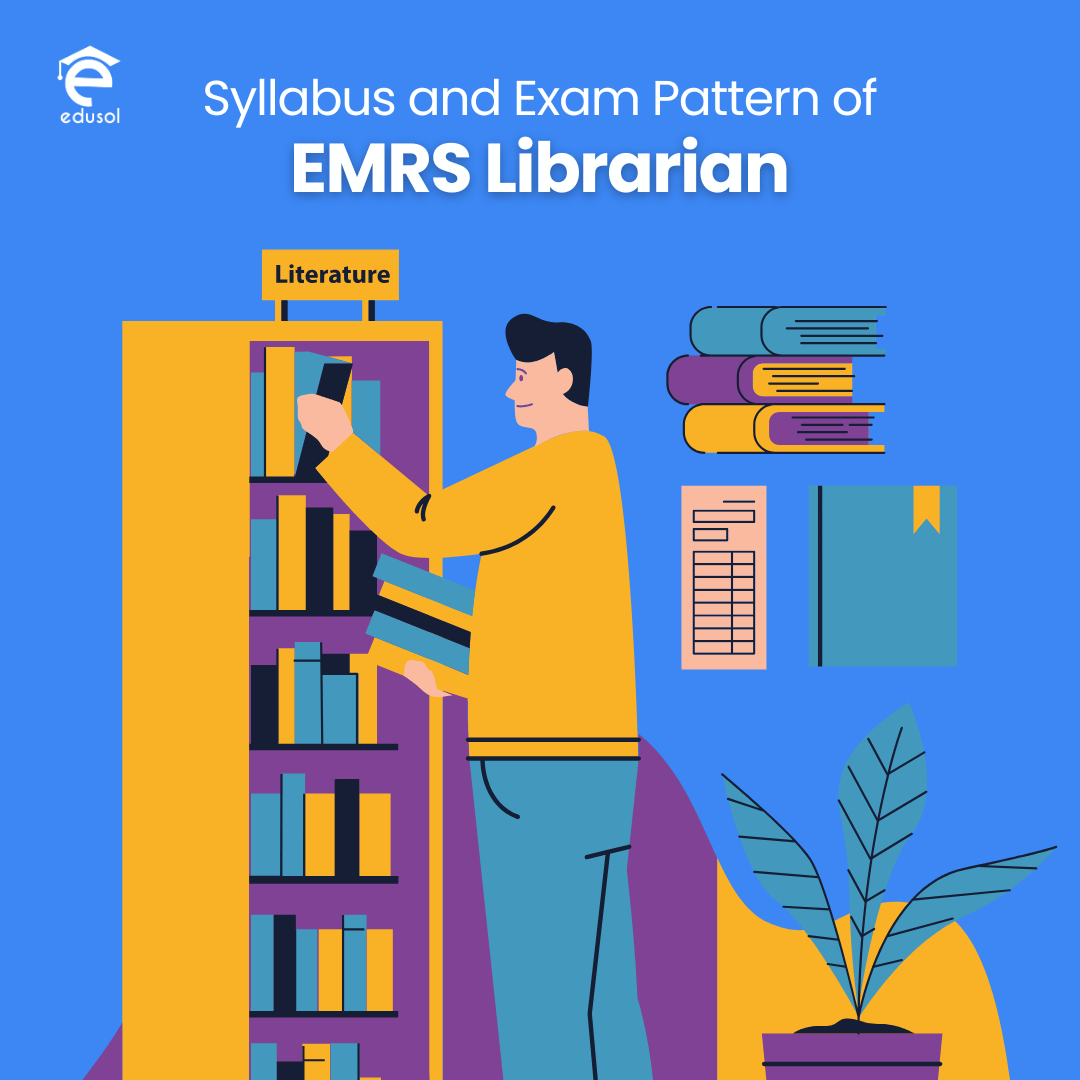Below is a detailed breakdown of the exam pattern and syllabus for the Eklavya Model Residential Schools (EMRS) Librarian Exam, conducted by the National Education Society for Tribal Students (NESTS), followed by tailored exam preparation tips inspired by Edusol (a structured educational solution approach) and Abhimanyu Sir (a hypothetical expert educator known for practical, student-centric strategies). The information reflects the latest patterns (e.g., ESSE-2023) and is contextualized for the 2025 recruitment cycle as of April 3, 2025. For the most current details, refer to nests.tribal.gov.in.
Exam Pattern for EMRS Librarian Exam
The EMRS Librarian Exam is a Computer-Based Test (CBT) under the EMRS Staff Selection Exam (ESSE), designed to assess general aptitude, teaching skills, and Library and Information Science expertise.
- Mode of Exam: Online (CBT)
- Duration: 3 hours (180 minutes)
- Total Questions: 150 (Multiple Choice Questions – MCQs)
- Total Marks: 150
- Marking Scheme:
- 1 mark per correct answer.
- Negative marking: 0.25 marks deducted per incorrect answer.
- Language: Bilingual (English and Hindi)
Section-Wise Breakdown
| Section | Number of Questions | Marks | Remarks |
|---|---|---|---|
| General Awareness | 10 | 10 | Current affairs and general knowledge |
| Reasoning Ability | 10 | 10 | Logical and analytical skills |
| Knowledge of ICT | 10 | 10 | Basic computer and IT skills |
| Teaching Aptitude | 10 | 10 | Teaching methodology and pedagogy |
| Domain Knowledge (Library) | 80 | 80 | Library and Information Science (core section) |
| Language Competency Test | 30 | 30 | General English (10), General Hindi (10), Regional Language (10); Qualifying |
Key Points
- Language Competency Test: Qualifying; requires 40% in each language (English, Hindi, Regional Language) for other sections to count.
- Negative Marking: 0.25 marks penalty per wrong answer.
- Selection Process:
- CBT: Clear the cutoff.
- Document Verification: No interview for Librarian posts.
Detailed Syllabus for EMRS Librarian Exam

1. General Awareness (10 Marks)
- Current affairs (national/international, tribal education focus)
- Indian history, geography, polity, economy
- General science, technology
- Sports, awards, important days
2. Reasoning Ability (10 Marks)
- Verbal/non-verbal reasoning
- Puzzles, seating arrangements
- Coding-decoding, blood relations
- Analogies, syllogism, direction sense
3. Knowledge of ICT (10 Marks)
- Computer basics (hardware, software)
- Operating systems (Windows, Linux basics)
- MS Office (Word, Excel, PowerPoint)
- Library automation (KOHA, LIBSYS)
- Internet, email, OPAC, RFID
4. Teaching Aptitude (10 Marks)
- Teaching-learning processes
- Classroom management
- Child psychology
- Pedagogical techniques
- Library’s role in education (NEP 2020)
5. Domain Knowledge: Library and Information Science (80 Marks)
Unit 1: Foundations
- Libraries as social institutions
- Types (public, academic, special)
- Five Laws of Library Science
- Associations (ILA, IFLA)
- Library development in India
Unit 2: Library Management
- Management principles
- Collection development
- Operations (circulation, stock verification)
- Budgeting, infrastructure
Unit 3: Knowledge Organization
- Classification (DDC, UDC, CC)
- Cataloguing (AACR2, RDA, MARC)
- Subject indexing
Unit 4: Information Sources and Services
- Sources (primary, secondary, tertiary)
- Reference services
- CAS, SDI, ILL
- E-resources
Unit 5: Information Technology
- Automation (KOHA, LIBSYS)
- Digital libraries
- Networks (INFLIBNET, DELNET)
- Emerging trends (AI, cloud)
Unit 6: Laws and Ethics
- Library legislation
- Copyright, IPR
- Professional ethics
Unit 7: Research and Extension
- Research methods
- Bibliometrics
- Extension services, preservation
6. Language Competency Test (30 Marks)
- General English: Grammar, vocabulary, comprehension
- General Hindi: व्याकरण, शब्दावली, गद्यांश
- Regional Language: Basic proficiency
Exam Tips by Edusol and Abhimanyu Sir
Edusol Tips (Structured, Solution-Oriented Approach)
- Modular Study Plan:
- Divide syllabus into 7 Library Science units (1-2 weeks each), 4 aptitude sections (1 week combined), and languages (daily 30 mins).
- Example: Week 1—Classification (DDC/CC), Week 2—Cataloguing (AACR2/RDA).
- Resource Optimization:
- Books: Library and Information Science by C.K. Sharma, Reasoning by R.S. Aggarwal.
- Online: Edusol-style platforms (Unacademy, Testbook) for mock tests, video lectures.
- Current Affairs: Monthly magazines (Yojana, tribal focus).
- Practice-Driven Learning:
- Take 1 full-length mock test weekly (150 questions, 3 hours).
- Analyze errors to reduce negative marking (target 80% accuracy).
- Use flashcards for quick recall (e.g., Five Laws, MARC fields).
- High-Weightage Focus:
- Prioritize Library Science (80 marks): Master classification, cataloguing, IT applications.
- ICT: Focus on library software (KOHA, OPAC) alongside basics.
- Time Management:
- Allocate 90 mins for Library Science, 45 mins for aptitude sections, 45 mins for languages in practice tests.
- Use Edusol’s “Pomodoro” (25 mins study, 5 mins break) for daily prep.
Abhimanyu Sir Tips (Practical, Student-Centric Strategies)
- Understand the ‘Why’:
- Relate syllabus to real-world librarian roles in tribal schools (e.g., how DDC helps organize books for students).
- Visualize success: “I’m managing an EMRS library efficiently.”
- Smart Shortcuts:
- Reasoning: Use elimination method—rule out 2-3 options to guess safely.
- Library Science: Memorize key numbers (e.g., DDC 22nd edition, MARC 21 fields) with mnemonics.
- Daily Micro-Goals:
- Day 1: 20 classification questions, 10 current affairs MCQs.
- Day 2: 15 cataloguing rules, 10 ICT terms.
- Abhimanyu Sir’s mantra: “Small wins build big victories.”
- Beat Negative Marking:
- Attempt only 70-80% of questions with confidence; skip if unsure beyond 50-50.
- Practice 50 MCQs daily, aiming for 40+ correct.
- Tribal Context:
- General Awareness: Focus on tribal education policies (e.g., EMRS goals, NEP 2020).
- Teaching Aptitude: Link library services to tribal student needs (e.g., multilingual resources).
- Language Mastery:
- English/Hindi: Solve 10 grammar questions daily (Wren & Martin, Hindi vyakaran).
- Regional Language: Practice basic translation/comprehension if weak.
- Last-Minute Boost:
- Revise Library Science formulas (e.g., Ranganathan’s laws) and ICT tools 2 days before.
- Abhimanyu Sir’s tip: “Sleep well, stay calm—your brain works best when rested.”
Combined Edusol + Abhimanyu Sir Strategy
- Week 1-4: Edusol’s structured Library Science deep dive + Abhimanyu’s daily micro-goals (e.g., 20 MCQs/day).
- Week 5-6: Edusol mock tests + Abhimanyu’s shortcut techniques for reasoning/ICT.
- Week 7: Revision (Library Science + GK) + language practice for qualifying marks.
- Exam Day: Start with Library Science (80 marks), then aptitude, finish with languages—stay calm, avoid overthinking.
Final Notes
The EMRS Librarian Exam hinges on Library Science mastery (80/150 marks), balanced with aptitude and language skills. Edusol’s systematic approach ensures coverage, while Abhimanyu Sir’s practical tips boost efficiency and confidence. Check nests.tribal.gov.in for updates. For specific resources or mock tests, let me know!


